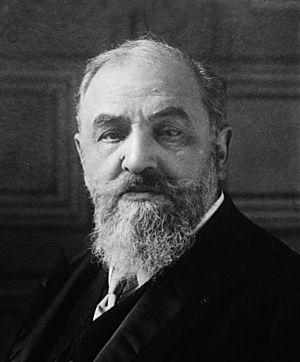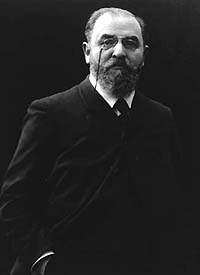Léon Bourgeois facts for kids
Quick facts for kids
Léon Bourgeois
|
|
|---|---|
 |
|
| Prime Minister of France | |
| In office 1 November 1895 – 29 April 1896 |
|
| President | Félix Faure |
| Preceded by | Alexandre Ribot |
| Succeeded by | Jules Méline |
| President of the Senate | |
| In office 14 January 1920 – 22 February 1923 |
|
| Preceded by | Antonin Dubost |
| Succeeded by | Gaston Doumergue |
| President of the Chamber of Deputies | |
| In office 10 June 1902 – 12 January 1904 |
|
| Preceded by | Paul Deschanel |
| Succeeded by | Henri Brisson |
| Personal details | |
| Born | 21 May 1851 Paris |
| Died | 29 September 1925 (aged 74) Épernay |
| Political party | None |
| Alma mater | Université de Paris |
Léon Victor Auguste Bourgeois (born May 21, 1851 – died September 29, 1925) was an important French leader. His ideas greatly influenced the Radical Party. He believed in fair taxes, like a tax on income, and social support programs. He also wanted more chances for everyone to get an education.
In foreign policy, he strongly supported the League of Nations. This group aimed to keep peace around the world. He believed in solving problems peacefully through compulsory arbitration (where a neutral person helps decide). He also wanted countries to reduce their weapons and use economic sanctions (economic penalties) against those who broke the peace. He even thought an international military force might be needed.
Contents
Léon Bourgeois's Early Life and Career
Léon Bourgeois was born in Paris on May 21, 1851. His family was not rich, and his father was a watchmaker. He studied law and finished university in 1874.
After his studies, he worked in public service. He became a prefect (a government official in charge of a region) in Tarn in 1882 and then in Haute-Garonne in 1885. Later, he moved back to Paris to work in the Ministry of the Interior. In 1887, he became the Prefect of Police in Paris. This was a very important job at a difficult time for the country.
Entering Politics and Key Roles
In 1888, Bourgeois became a deputy (a member of parliament) for the Marne region. He joined the Radical Left political group. He quickly took on important roles in the government.
He served as an undersecretary for Home Affairs in 1888. In 1890, he became the Minister of Public Instruction. This meant he was in charge of education. He made important changes to secondary education in 1890.
In 1892, he became the Minister of Justice. This was a challenging time due to some big financial scandals. He worked hard to deal with these issues.
Léon Bourgeois as Prime Minister
In November 1895, Léon Bourgeois became the Prime Minister of France. His government was known for its radical ideas. However, his government faced a big challenge. The Senate (a part of the French parliament) refused to approve his budget.
Bourgeois believed that the public would support his government over the Senate. But the public did not get involved, and the Senate won. This event made it harder for Bourgeois to lead a government again.
Later Political and International Work
Even after his time as Prime Minister, Bourgeois continued to serve France. In 1898, as Minister of Public Instruction again, he helped create adult education programs. He also represented France at the Hague Peace Conventions. These were important meetings to discuss international peace.
In 1903, he became a member of the permanent court of arbitration. This court helps countries solve disagreements peacefully. He was elected president of the Chamber of Deputies in 1902 and 1903. In 1905, he became a senator for the Marne region.
In May 1906, he became the Minister of Foreign Affairs. He played a key role in French diplomacy during the Algeciras Conference. He also attended both Hague Peace Conferences in 1899 and 1907. After World War I, he was a delegate to the Paris Peace Conference. He strongly supported the Japanese Racial Equality Proposal. He called it a "principle of justice."
Nobel Peace Prize and Solidarism
After World War I, Léon Bourgeois became the President of the Council of the League of Nations. This was a very important role in the new international organization for peace. For his work, he won the Nobel Peace Prize in 1920.
Bourgeois developed an idea called "solidarism." This was a way of thinking that tried to find a middle ground between socialism and capitalism. He believed that wealthy people had a "social debt" to those who were less fortunate. He thought they should pay this debt through income taxes. This money would then help the government fund social programs for people in need. However, the Senate opposed his tax ideas, which led to his resignation as prime minister.
Support for Natural History Museum
Léon Bourgeois was also interested in science and nature. He was one of the people who helped start the "Friends of the Natural History Museum Paris" society. He was the very first president of this society, serving from 1907 to 1922.
See also
 In Spanish: Léon Bourgeois para niños
In Spanish: Léon Bourgeois para niños
 | Calvin Brent |
 | Walter T. Bailey |
 | Martha Cassell Thompson |
 | Alberta Jeannette Cassell |


